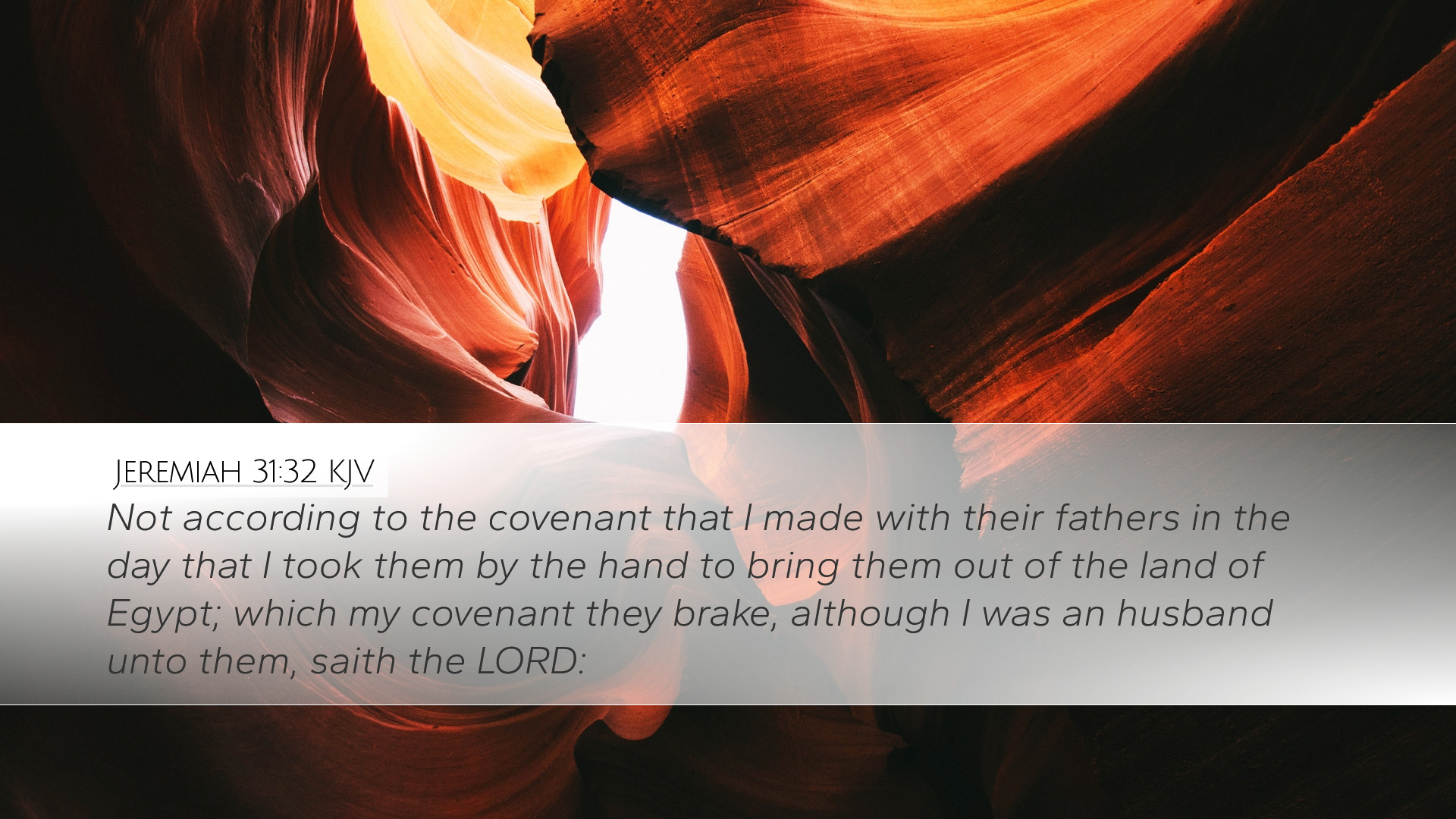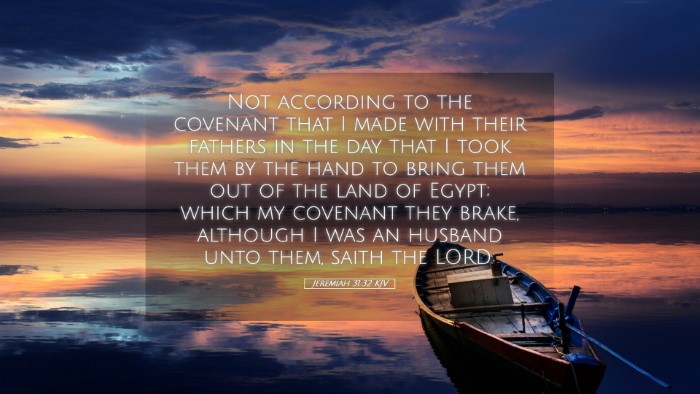Commentary on Jeremiah 31:32
Verse: "Not like the covenant that I made with their fathers on the day when I took them by the hand to bring them out of the land of Egypt, my covenant that they broke, though I was their husband, declares the LORD."
Introduction
This verse is part of a powerful prophecy from the prophet Jeremiah, focusing on the new covenant that God promises to establish with His people. It signifies a shift from the old covenant, which was characterized by the Law and often broken by the Israelites. In this commentary, we will explore insights from notable public domain sources, including Matthew Henry, Adam Clarke, and Albert Barnes, to deepen the understanding of this profound verse.
The Old Covenant
Matthew Henry emphasizes the nature of the old covenant as one rooted in the Law given at Sinai. He notes that this covenant was conditional and required obedience, which the Israelites repeatedly failed to uphold. The repeated transgressions of God’s law demonstrated the inability of the people to maintain their end of the covenant.
- Condition of Obedience: The importance of obedience to God’s commandments was foundational to the old covenant. The failure to comply resulted in the severe consequences of exile and judgment.
- Divine Relationship: God likens Himself to a husband, indicating a covenantal relationship filled with love and expectations. The Israelites’ unfaithfulness led to a breach of this relationship, illustrating the emotional weight of their actions.
The New Covenant
In contrast, Albert Barnes heralds the coming of the new covenant as a promise of restoration and a transformative relationship. He articulates that the new covenant is based not on law alone but on grace and an internalized relationship with God, where the Law is written on the heart.
- Internalization of the Law: Obedience becomes a natural manifestation of one’s relationship with God through the indwelling of the Holy Spirit. This signifies a shift from external adherence to internal conviction.
- Personal Relationship: The new covenant offers a personal and intimate connection with God, which was anticipated but not fully realized under the old covenant.
The Nature of God’s Faithfulness
Adam Clarke points to the unwavering faithfulness of God despite human failure. The verse eloquently depicts God’s commitment to His people. The phrase “though I was their husband” speaks to His steadfast love and care despite their rebellion.
- God's Commitment: Clarke notes that God's faithfulness stands in stark contrast to human unfaithfulness, reinforcing the idea that God does not abandon His promises.
- Hope for Restoration: The assurance of a new covenant provides hope for those who feel the weight of their inadequacies under the law. It invites them to trust in God’s mercy and grace.
Theological Implications
This verse encourages deep theological reflection on topics such as covenant theology, the nature of sin, and divine grace. The shift from an externals-based religion to one founded upon a living relationship with God challenges both pastors and scholars to reconsider how they present God’s covenantal promises to their congregations and communities.
Covenant Theology
Understanding the transition from the old to the new covenant is crucial for grasping God’s redemptive plan. Henry argues that this prophecy foreshadows the establishment of the new covenant through the life and ministry of Jesus Christ, who fulfills and transcends the law.
The Nature of Sin
The verse sheds light on the persistent nature of sin. Even with divine assistance, humanity is prone to rebellion. This reality serves as a reminder of the necessity for grace and the profound debt owed to Christ’s redemptive work.
Divine Grace
The highlight of this new covenant lies in the theme of grace, which transcends the limitations of the law. Both Barnes and Clarke emphasize the importance of embracing the new covenant as an invitation into a relationship defined by grace rather than fear of retribution.
Conclusion
Jeremiah 31:32 encapsulates the essence of God’s heart towards His people and His unparalleled faithfulness. This verse not only informs us about the distinction between the old and new covenants but also compels us to reflect upon our faithfulness in response to God’s faithfulness. The insights derived from the commentaries provide a rich tapestry for understanding both the historical and redemptive implications of God’s covenant, encouraging a deeper walk with Him.


